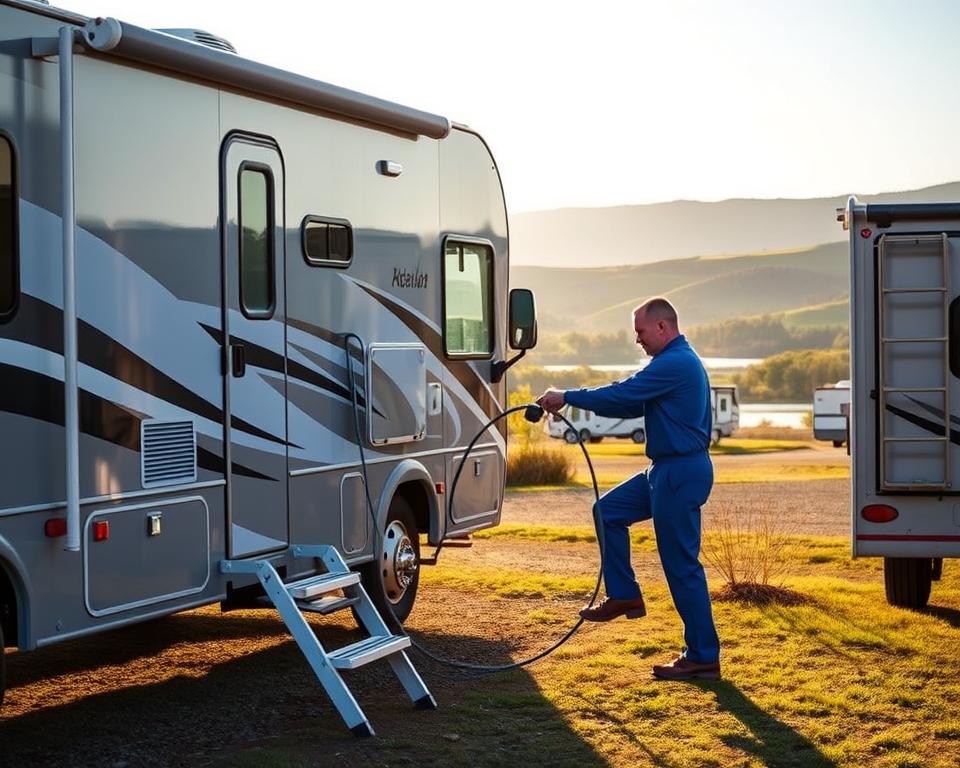Optimize Your RV Water System with a Pressure Tank
Have you ever wondered the impact of an RV pressure tank on your camping journeys? During your travels, your RV’s plumbing system becomes vital for everyday tasks such as bathing and dishwashing. Fine-tuning this system ensures a consistent and dependable water flow, crucial for road life. Let’s explore how an RV pressure tank can improve your onboard water system – RV holding tank pump out service, heightening comfort during your adventures.
Important Notes
- A camper pressure tank boosts flow on the move.
- Dependable pressure matters for routine use.
- Optimizing your RV water system increases comfort while camping.
- Pressure tanks help maintain consistent water pressure.
- Enhanced delivery benefits every fixture.
Why a Dependable RV Water System Matters
Consistent plumbing is key to enjoyable RV trips. It ensures everyday activities such as showering, washing dishes, and using the toilet are trouble-free. Challenges such as low water pressure can impede these activities, highlighting the necessity of proper water flow in your RV.
Low water pressure can stem from several issues. Common culprits include leaks, blockages, and low supply. Not only do these problems disrupt convenience, but they can also lead to bigger problems without timely intervention. Thus, regular upkeep is essential for a well-functioning RV plumbing system.
Important aspects of maintaining a dependable RV water system include:
- Regularly checking for leaks in pipes and connections
- Cleaning or replacing clogged filters when necessary
- Employing a water pressure regulator to safeguard against surges
Keeping these practices top of mind empowers RV owners to enhance their water flow. It makes the camping experience enjoyable.

Role of the Pressure Tank in Your RV’s Water System
An RV pressure tank plays a crucial role in a recreational vehicle’s water system. It ensures water pressure remains even and dependable. This component stores and buffers water, making it available even when demand peaks. It avoids the inconvenience caused by pressure fluctuations.
The design of an RV water pressure tank often incorporates a bladder or diaphragm. This feature separates water from air, allowing for rapid pressurization. Understanding how a camper pressure tank works empowers RV owners to manage their plumbing. A quality motorhome pressure tank enhances water delivery’s reliability and efficiency.
The Way a Pressure Tank Improves Water Delivery
An RV pressure tank plays a crucial role by providing consistent water flow. It prevents interruptions when multiple water sources are used at once. When faucets, showers, and toilets operate together, a pressure tank maintains uniform pressure.
This tank reduces pump cycling, leading to better energy use. It stores pressurized air, pushing water through the system. This results in the water pump activates less frequently. The result? Lower power draw and an extended water pump life.
With pressure tanks, campers benefit from steady delivery, enhancing their experience. Consistent showers and efficient dishwashing become the norm. Understanding its operation helps you sidestep flow issues.
| Characteristic | Advantage |
|---|---|
| Uniform Flow | Enhances overall water flow, improving usability |
| Reduced Pump Activation | Lowers energy consumption and extends pump life |
| Quick Water Delivery | Ensures water is ready across multiple outlets |
| Simple Setup | Makes retrofits straightforward |
Advantages of a Camper Pressure Tank
Adding a pressure vessel delivers multiple benefits. It leads to consistent water pressure, enhancing showering, cooking, and cleaning experiences. The absence of sudden water flow drops allows for fluid operation.
Another key benefit is the relief it offers your water pump. By maintaining steady pressure, the tank extends the pump’s lifespan and cuts down on repair needs. This results in noticeable maintenance cost savings and less inconvenience over time.
Better water usage is another benefit. It helps avoid common pressure-related problems like leaks. These tanks raise plumbing system reliability, ensuring hassle-free trips. With proper setup and maintenance, they bring assurance and comfort.
How to Select the Best Pressure Tank
Selecting the right tank involves several considerations to match your RV water system’s needs. Start by evaluating tank capacity. RV pressure tanks vary in size; knowing how much water you use will help pick the right one.
The tank’s material significantly impacts durability. Tanks constructed from stainless steel or polyethylene last longer and resist corrosion. It’s crucial to select a tank that handles road vibrations and varying climates.
Diaphragm tanks stand out when considering options. They efficiently maintain pressure and reduce water hammer. Checking model specifications ensures compatibility with your system.
Consulting specialists helps. They ensure the tank works well with your RV’s plumbing, so you get a setup that runs flawlessly.
How to Fit the Pressure Tank
Installing a pressure tank in your camper is a crucial step toward enhancing your RV’s water system efficiency. It’s important to be thorough and follow plumbing best practices. Start by picking the right spot for future maintenance.
Then, securely attach the inlet and outlet pipes. Make sure everything is leak-free. A key part is checking the precharge level, which is critical for peak efficiency.
If you’re not confident in your installation skills, seek professional help, like those at All in Sanitation. Their expertise guarantees proper fitting, boosting your system’s delivery and longevity. Always adhere to manufacturer guidelines for best results and durability.
| Installation Steps | Details |
|---|---|
| Choose Position | Pick a convenient spot with easy access |
| Connecting Pipes | Tighten fittings properly |
| Verify Precharge | Match manufacturer specs for best performance |
| Adhere to Guidelines | Stick to install instructions exactly |
| Consult Experts | Ensure proper setup |
Pressure Tank Maintenance Tips
To maximize lifespan, maintain regularly. Monthly leak inspections are critical to prevent water waste and ensure air pressure settings are optimal. Additionally, check and clean filters regularly.
Cleaning the filter is vital to avoid blockages and maintain smooth flow. An annual inspection is recommended to assess the tank’s performance and the associated plumbing. Keeping a detailed log of inspections and repairs helps.
By keeping your system in top shape, you ensure a consistent water supply, making every trip more enjoyable.
| Maintenance Task | How Often | Description |
|---|---|---|
| Leak Inspection | Every Month | Inspect connections and seams for water seepage |
| Precharge Inspection | Every Month | Use a gauge |
| Water Filter Cleaning | Every 3 Months | Remove debris and flush filter |
| Yearly Service | Yearly | Assess tank and plumbing health |
Maximizing Water Pressure with Additional Strategies
Smart habits raise your system’s efficiency. A water pressure regulator is vital, as it maintains constant delivery and prevents damage from pressure spikes.
Avoid running multiple outlets at once. Stagger usage, for example, don’t run shower and dishwasher together.
Shortening shower times is key for maintaining strong pressure. This reduces demand on the system, improving overall performance.
Keeping the water filter clean is crucial. A clogged filter restricts flow and undermines pressure. Regular maintenance ensures optimal performance.
Regular checks of the water heater bypass valve are essential. Proper valve operation supports efficient flow, boosting the camper’s water system.
| Tip | What to Do | Impact on Water Pressure |
|---|---|---|
| Pressure Limiter | Maintain steady water pressure | Protects plumbing, ensures uniform flow |
| Stagger Usage | Avoid simultaneous outlets | Improves pressure for prioritized needs |
| Shorter Showers | Keep showers brief | Stops pressure from dropping |
| Filter Flushing | Ensure the filter is free from debris | Prevents clogs |
| Valve Inspection | Regularly inspect for proper operation | Supports smooth flow |
Wrapping It Up
Recognizing the significance of the RV pressure tank is vital for enhancing your RV water system. It ensures a constant water flow and adequate pressure, improving your road experiences. This reliability turns camping into stress-free outings.
Proper setup and upkeep maximize gains. Routine checks prevent flow hiccups. Adopting best practices keeps delivery steady.
Adopting these measures ensures a dependable water system, enriching your RV lifestyle. You can relish your time outdoors without concerns over water quality or supply. Enjoy your journeys with peace of mind!


